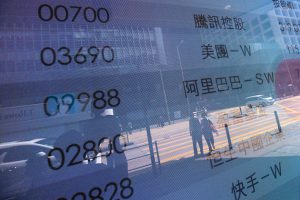BLOOMBERG
Chinese stocks saw volatile trading as worrying signs mount in all corners of the economy. The Hang Seng Index, where a majority of the members are mainland firms, closed little changed after falling more than 2% earlier, which took losses since a January high to 21%. A gauge of Chinese tech stocks gained 0.8%, flipping from a 2.5% loss. The mid-day bounce was seen as technical by traders, with the market still gripped by fears that the slump in the property sector may snowball into a bigger systemic crisis. Steps to boost the market including an interest-rate cut and authorities asking funds to avoid net selling equities have done little to revive sentiment, as investors see no easy fix to the Chinese economy’s ailments.
“The contagion risks from the real estate sector and trust defaults are a big concern,” said Vey-Sern Ling, managing director at Union Bancaire Privee. “The economy is clearly struggling and it increasingly looks like the government may not have the tools to arrest it.”
The picture emerging from property agents and private data providers suggest the slump in the real estate market may be worse than official reports show. In another effort to boost confidence, China’s top leaders pledged to expand domestic consumption and support the private sector in a Wednesday statement, but again lacked details on any new stimulus measures. Morgan Stanley became the latest investment bank to cut its forecasts for China’s economic growth, citing weaker investment due to the property market slump and local government financial stress. It now sees gross domestic product expanding 4.7% this year, below Beijing’s target.
Analysts pointed to excessive selling in recent days to explain the rebound on Thursday. The Hang Seng Index saw five sessions of consecutive losses and its 14-day relative strength index is around 33, close to the level of 30 that suggests shares are oversold.
 The Gulf Time Newspaper One of the finest business newspapers in the UAE brought to you by our professional writers and editors.
The Gulf Time Newspaper One of the finest business newspapers in the UAE brought to you by our professional writers and editors.
